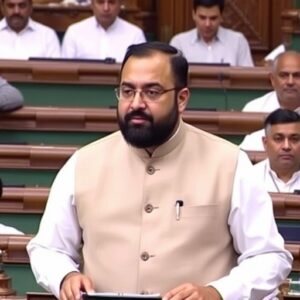India Celebrates Constitution Day: A Reflection on Democracy and Governance
India observed Constitution Day on December 14, 2024, with a focus on the Constitution’s pivotal role in the country’s democratic governance. Leaders from different political parties discussed its impact and ongoing relevance. They stressed the importance of maintaining democratic values and protecting citizens’ rights, while also examining current challenges.

The Role of the Indian Constitution
India’s Constitution, adopted in 1949 and effective from 1950, guides the country’s legal framework. It ensures justice, equality, and liberty for all citizens. The Constitution remains relevant today, providing a foundation for governance, political stability, and social justice. Over the years, amendments have been made to adapt to the country’s changing needs.
Prime Minister’s Address on Constitutional Achievements
Prime Minister Narendra Modi opened the debate by praising the Constitution. He emphasized its role in fostering social justice and economic development. Modi highlighted government efforts to address inequality through policies that empower marginalized groups. According to Modi, India’s progress and unity are a direct result of the constitutional principles of democracy and justice.
Opposition Voices on Secularism and Democracy
Opposition leaders raised concerns about the state of democracy. Rahul Gandhi stressed the need to preserve the Constitution’s secular nature and protect the rights of all citizens. He warned against political polarization and the marginalization of vulnerable groups. Leaders from other opposition parties also expressed worries about the independence of key democratic institutions.
Judicial Reforms and Transparency in Appointments
The debate touched on judicial reforms. Many leaders agreed that a backlog of cases in courts is a serious issue. They called for reforms to make the judicial process more efficient. Suggestions included improving transparency in judicial appointments to ensure independence and fairness.
Federalism and Power Distribution
Another topic was the balance of power between the central government and the states. Some leaders argued that the Constitution’s federal provisions should be revisited. They called for more autonomy for state governments, especially in addressing regional issues, while maintaining national unity.
Educational Campaign to Raise Constitutional Awareness
The government launched an educational campaign aimed at young people to increase awareness about the Constitution. Union Education Minister Dharmendra Pradhan emphasized the need for students to understand their constitutional rights and duties. The initiative includes seminars, debates, and online resources to engage students across India.
Looking Ahead: Preserving Constitutional Values
As India celebrates its 75th year of independence, the Constitution remains central to the country’s growth. The Constitution Day debates reinforced the need to uphold its values of justice, equality, and democracy. Leaders agreed that while India has made significant progress, challenges remain. They stressed the importance of preserving the integrity of democratic institutions and the rule of law.
In conclusion, Constitution Day serves as a reminder of the enduring importance of the Constitution in shaping India’s future. It encourages citizens to reflect on the values that guide the nation and to protect them for future generations.
More news available on our new website: n7tv – Stay Informed, Stay Ahead







